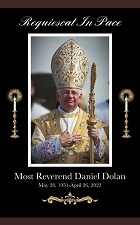A meditation
When catastrophes like earthquakes, droughts, floods, hurricanes occur that causes cataclysmic damages and devastating destruction, many people ask "Is God unjust?"
The answer is - God is always just, and warns people who are living in mortal sin which cry to Heaven for vengeance through these catastrophes to repent and return back to Him.
At least, such interpretations of the cataclysms of nature complies with the Holy Scripture and Holy Tradition.
"Sins that cry to heaven for vengeance are sins of great malice. They are: wilful murder, oppression of the poor, defrauding laborers of their wages, and the sin of Sodom.
The sin of Sodom takes its name from the inhabitants of Sodom, who were guilty of unnatural sins, by reason of which they were destroyed by God, Who rained down upon them brimstone and fire (Gen. xix. 24). The Dead Sea is still a mournful memorialof their sin; one so shameful that it must not be named among us." (1)
However, we should keep in mind that God's punishments differ from humans' in that God is always just. All His punishments end with positive results and good outcome for a just man in this world and a happy ending in Eternity as well.
Unlike God’s punishments, human punishments can often be unjust, because in many cases they results into unfortunate outcomes for the punished.
The essential difference between God’s and human punishments is that God always gives man a chance to do penance, while men’s punishments give little chance or no opportunity for them, when they are convicted, to do so.
Almost every unjust war, initiated by people of evil will, causing a lot of destruction, is called “holy” in the "name of God" or in the "name of justice". Although "justice" for those people has nothing common with the Justice of God, nevertheless God sometimes uses human wars as a ‘scourge’, punishing us for our sins. This is clearly seen from the history of the Old Testament.
There are countless examples during the Apostolic times and in the history of the Church when God sometimes allows the punishment of the innocents by the hands of unjust sinners.
Unlike wars and catastrophes, caused by people, earthquakes, droughts, floods, hurricanes and other catastrophes happen by the Will of God. They are visible signs of God's Justice, and are temporal punishments for sins. All these catastrophic events should remind us that more terrible things may come upon us, i.e., the eternal tortures of the damned.
"Sinners begin their hell even on earth.
The wicked are like the raging sea which can never rest (Is. lvii. 20). Every sinner sits in "darkness and in the shadow of death" (Luke i. 79). To him the lessons of religion are folly (1 Cor. ii. 14). It is in the hour of death that the worldling will awake to his misery; at present he feels it not, because he is distracted by a thousand things." (1.1)
Of course, not everyone is guilty of sins that cry to Heaven for vengeance, and that is why catastrophes doesn’t happen everywhere. Even in the same affected area some people are punished, but some are not.
Generally, God does not punish a man for sins committed by another man. A home of a man can be totally destroyed, while his neighbor’s home can be left untouched. It is because of God’s Justice.
In some cases, though God knows that a man is guilty of a certain mortal sin, He does not inflict punishment upon him immediately. God grants him more time to see His great patience and mercy.
By not immediately punishing such a sinner, God grants him a new opportunity to leave a mortal sin and turn to the path of penance and justice. It is because God is always just.
Only God Himself knows the right time and just punishment to be imposed upon a man or a certain group of people.
Every local chastisement is a threatening reflection of the upcoming General Judgment, and a warning for every man over the whole world “Do penance: for the kingdom of heaven is at hand” (ST. MATTHEW 3:2).
It’s not our duty to ask why the catastrophe happened here but not there, or why this man received this punishment but not another. Our duty is to keep God's Commandments, to do penance and to be ready to give an account before God anywhere and anytime. "The Lord delayeth not his promise, as some imagine: but dealeth patiently for your sake, not willing that any should perish, but that all should return to penance" (II OF ST. PETER, 3:9).
Cataclysms are also opportunities to do good works of mercy and charity for the spiritual and physical well being of our neighbor.
It also serves as a test of God on the faith of a just man as it was in the case of Job:
"Now upon a certain day when his sons and daughters were eating and drinking wine in the house of their eldest brother, There came a messenger to Job, and said: The oxen were ploughing, and the asses feeding beside them, And the Sabeans rushed in, and took all away, and slew the servants with the sword, and I alone have escaped to tell thee. And while he was yet speaking, another came, and said: The fire of God fell from how heaven, and striking the sheep and the servants. hath consumed them, and I alone have escaped to tell thee! And while he also was yet speaking, there came another, and said: The Chaldeans made three troops, and have fallen upon the camels, and taken them, moreover they have slain the servants with the sword, and I alone have escaped to tell thee. He was yet speaking, and behold another came in, and said: Thy sons and daughters were eating and drinking wine in the house of their elder brother, A violent wind came on a sudden from the side of the desert, and shook the four corners of the house, and it fell upon thy children and they are dead, and I alone have escaped to tell thee." (Job 1:13-19)
Job's example teaches us that no matter how painful it is to realize the horror of our situation, we need to understand that every action of God has good sense and just reason. His name will always be blessed.
"Then Job rose up, and rent his garments, and having shaven his head fell down upon the ground and worshipped. And said: Naked came I out of my mother‘s womb, and naked shall I return thither: the Lord gave, and the Lord hath taken away: as it hath pleased the Lord, so is it done: blessed be the name of the Lord. In all these things Job sinned not by his lips, nor spoke he any foolish thing against God." (Job 1:20-22)
Let God's Justice reign in this world and His name be praised and glorified.
Lord, I fear Thy justice, I implore Thy mercy; deliver me not to everlasting pains, grant that I may possess Thee in the midst of everlasting joys.
An indulgence of 500 days. (S. P. Ap., Dec. 18, 1940)
O Mary, make me to live in God, with God, and for God.
An indulgence of 300 days. (S. P. Ap., April 26, 1921) (2)
Together with our most Blessed Virgin Mary may we have the fear of God since ”His mercy is from generation unto generations, to them that fear Him”. (St. Luke 1:50)
Fr. Valerii
Sources:
The quotes from the Holy Scripture taken from: THE HOLY BIBLE PUBLISHED WITH THE APPROBATION OF THE CATHOLIC ARCHBISHOPS AND BISHOPS OF IRELAND. The Douay Version of the Old Testament of 1609, and with the Rhemish Version of the New Testament of 1582, Given at Dublin, May 4th, 1857.
(1) (1.1) THE CATECHISM EXPLAINED
FROM THE ORIGINAL of Rev. FRANCIS SPIRAGO, professor of Theology.
EDITED BY Rev. RICHARD F. CLARKE, S.J.
New York, Cincinnati, Chicago:
BENZIGER BROTHERS,
Printers to the Holy Apostolic See,
1899
Nihil Obstat, Thos. L. Kinkead, Censor Librorum.
Imprimatur + MICHAEL AUGUSTINE, Archbishop of New York.
New York, August 8, 1899.
pp. 460-461, 264
(2) THE RACCOLTA
by The Rev. Joseph P. Christopher, Ph.D.,
The Rt. Rev. Charles E. Spense, M.A. (Oxon),
The Rt. Rev. John F. Rowman, D.D,
By authorization of the Holy See,
Imprimatur, Francis Cardinal Spellman, Archbishop of New York,
In Festo Sanctae Franciscae Xaverii Cabrini, 1951,
The Holy See by a Rescript of the Sacred Penitentiary
dated May 30, 1951,
has authorized Benziger Brothers, Inc.,
to publish an English version of the work
known as “Enchiridion Indulgentiarum-Press et pia Opera,”
issued by Vatican Press in the year 1950.
by Benziger Brothers, Inc.
pp. 10, 212
|

